 CLOSING MASS
CLOSING MASS
Second Special Assembly for Africa
of the Bishops' Synod
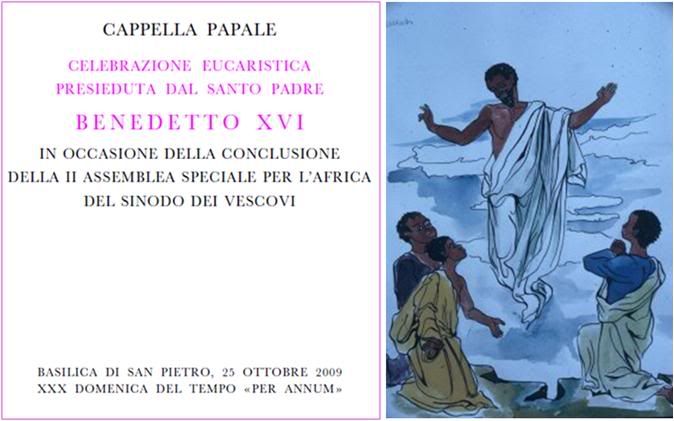 Illustrations for Mass libretto by African artists. Cover: The Transfiguration
Illustrations for Mass libretto by African artists. Cover: The Transfiguration
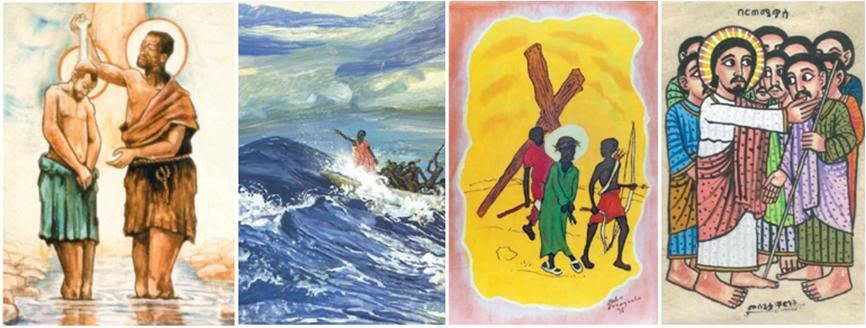

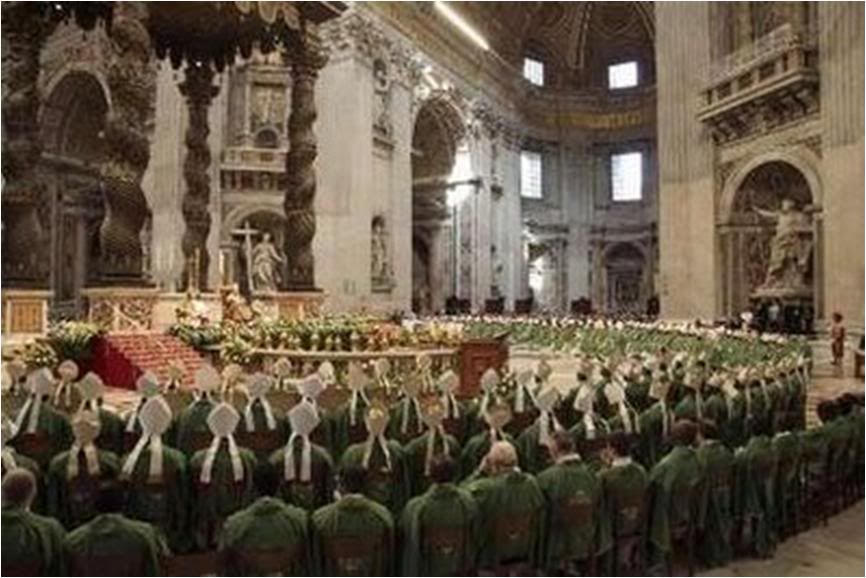
Pope calls Africa to
'Take courage, stand up'
as synod ends

ROME, Oct. 25 (dpa) - With a call to courage, Pope Benedict XVI ended a three-week long synod on Africa Sunday, telling attendees to seek the courage to find peace.
"Take courage, Africa, stand up!" appealed the Pope, telling the continent to seek "a peace that opens everyone of good will to overcome religious, ethnic, language and cultural differences."
In its final document, the synod urged Africans to work together for the continent's political-economic future. It added that the negative consequences of Africa's history of colonialism and the slave trade could no longer be used to excuse Africa's lack of development.
In effect, Africans must now set challenges for themselves and create conditions that respect human dignity.
Benedict repeated comments from an encyclical released in July, in which he called for "social globalization," a policy of promoting advancement and development for all countries, not just a chosen few.
He opened the synod October 4 with a strong appeal against modern- day colonialism and exploitation of the continent's wealth.
The day before, a document from the Synodal assembly criticized discriminatory immigration policies of the industrialized nations. Those "restrictive" policies and accompanying immigration laws go against basic universal rights and the teachings of the church, synod members said.
About 200 bishops discussed the future of Africa at the synod. One of them was Ghanese Cardinal Peter Kodwo Appiah Turkson, the new president of the Pontifical Council for Justice and Peace. He was appointed to the position Saturday to replace the retiring Cardinal Renato Raffaele Martino.
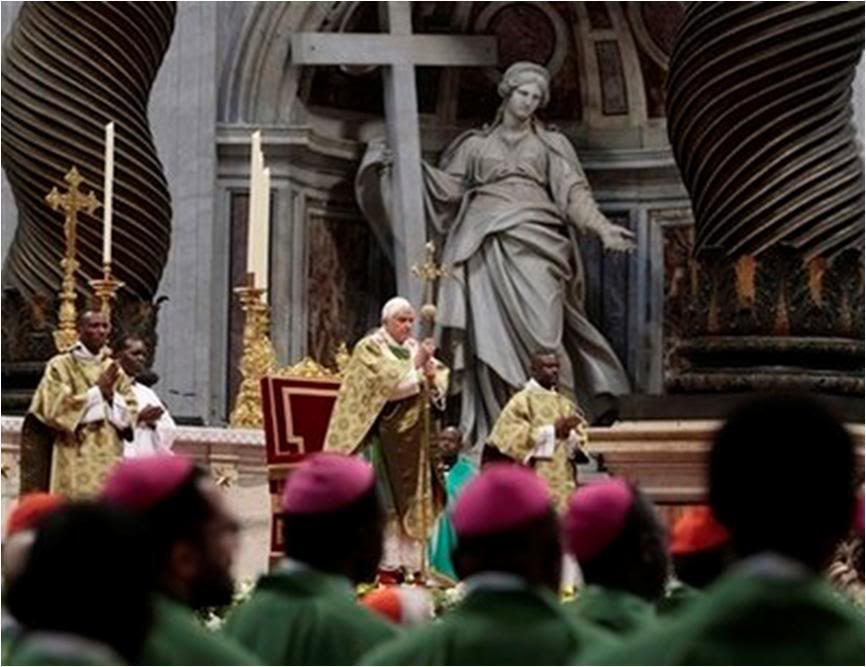
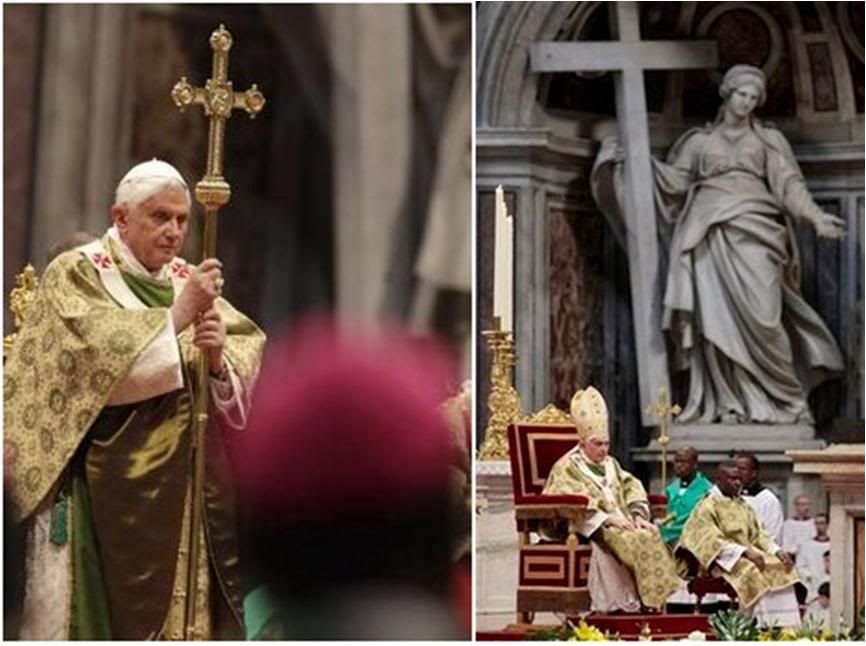
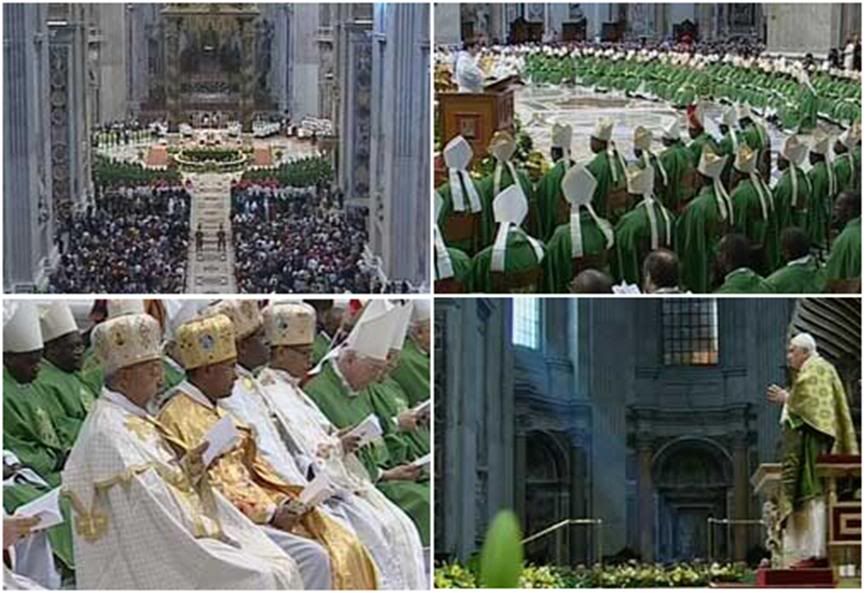
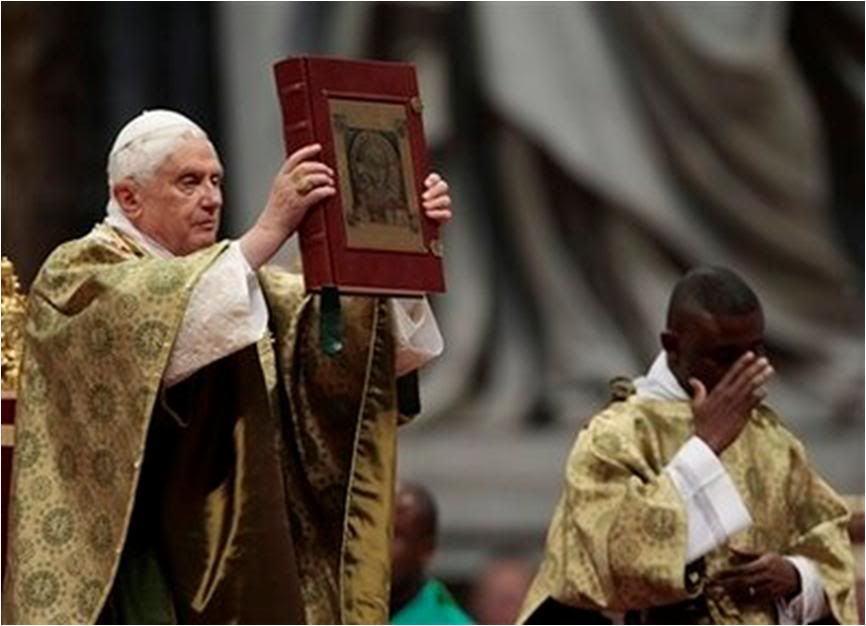 Here is a translation of the Holy Father's homily:
Here is a translation of the Holy Father's homily:
THE HOLY FATHER'S HOMILY
Venerated Brothers.
Dear brothers and sisters:
Here is a message of hope for Africa: We heard it just now in the
Word of God. It is the mesage that the Lord of history never tires of renewing for mankind oppressed and overcome in every age and on every land, since he revealed to Moses what he wished for the Israelites who were slaves in Egypt:
"I have witnessed the affliction of my people...and have heard their cry of complaint... I know well what they are suffering. Therefore I have come down to rescue them... and lead them out of that land into a good and spacious land, a land flowing with milk and honey" (Ex 3,7-8).
What is this land? Is it not perhaps the Kingdom of reconciliation, justice and peace, to which all of mankind is called? God's design does not change. It is the same that was prophesied by Jeremiah, in the magnificent oracles called 'The Book of Consolation', from which the first Reading today is taken.
It is an announcement of hope for the people of Israel, prostrated by the invasion of Nebuchadnezzar's army, by the devastation of Jerusalem and the Temple, and by the Babylonian exile.
It is a message of joy for the 'rest' of the sons of Jacob, which announces a future for them, because the Lord will lead them back to their land through a straight and convenient path.
Persons who are in need of support, like the blind and the lame, the mothers and those with child, will experience the strength and the tenderness of the Lord: he is a father for Israel, ready to care for it as for his firstborn (cfr Jer 31.7-9).
God's design does not change. Through the centuries and the upheavals of history, He aims at the same goal: the Kingdom of freedom and peace for all. This implies his favor for those who are deprived of freedom and peace, for those who are violated in their very dignity as human beings.
Let us think especially of our brothers and sisters in Africa who suffer poverty, disease, injustices, wars and violence, and enforced migrations. These sons beloved by the heavenly Father are like the blind man in the Gospel, Bar-Timaeus, who "sat by the roadside begging" (Mk 10,46) at the gates of Jericho, precisely where Jesus the Nazarene would pass.
It is the road that leads to Jerusalem, where he will spend the Pasch, his sacrificial Pasch, at which the Messiah will make his way to us. It is the road of his exodus which is also ours: the only way that leads to the land of reconciliation, justice and peace.
On that road, the Lord met Bar-Timaues, who has lost his sight. Their paths cross and become one. "Son of David, Jesus, have pity on me!", the blind man cries out trustingly. Jesus says, "Call him!", and adds: "What do you want me to do for you?"
God is light and the creator of light. Man is the child of light, made to see the light, but he has lost his sight, and finds himself forced to beg. The Lord passes by, he who who has made himself a beggar before us: thirsty for our faith and our love.
"What do you want me to do for you?". God knows, but he asks us - he wants man to speak. He wants man to get up on his feet, to recover the courage to ask for that which corresponds to his dignity. The Father wants to hear from his child the desire to see the light once more, the light for which he was created.
"Master, I want to see." And Jesus tells Bar-Timaeus: "'Go - your faith has saved you.' Immediately he received his sight and followed him on the way" (Mk 10,51-52).
Dear brothers, let us give thanks because this 'mysterious encounter btween our poverty and the greatness of God" took place even at the Synodal assembly for Africa which ends today.
God has renewed his call: "Take courage. get up" (Mk 10,49). And even the Church in Africa, through its pastors, who have come from all the nations of the continent, from Madaagascar and other islands, have received the message of hope and light to walk along the road that leads to the Kingdom of God.
"Go, your faith has saved you!" (Mk 10,52). Yes, faith in Jesus Christ - when it is well intended and practised - leads men and peoples to freedom in truth, or to use the three words of the Synodal theme, to reconciliation, justice and peace.
Bar-Timaeus, healed, who follows Jesus on his way, is the image of mankind who, illuminated by faith, sets forth towards the promised land. Bar-Timaeus becomes, in turn, a witness for the light, recounting and demonstrating in person that he has been healed, renewed, regenerated.
This is the Church in the world: a community of persons who are reconciled, who work for justice and peace: 'salt and light' in the midst of the societies of men and nations.
That is why the Synod has reaffirmed forcefully - and has shown - that the Church is the Family of God, in which there cannot be divisions on the basis of race, language or culture.
Moving testimonies have shown us that even in the darkest moments of human history, the Holy Spirit is at work and transforms the hearts of victims and persecutors so that they recognize themselves as brothers.
The reconciled Church is a powerful leaven for reconciliation in individual nations and in the whole African continent.
The second Reading offers us a further perspective: The Church, a community that follows Christ on the way of love, has a priestly form. The category of priesthood, as an interpretative key for the mystery of Christ, and consequently, of the Church, was introduced in the New Testatment by the author of the Letter to the Hebrews.
His intuition takes its source from Psalm 110, cited in today's passage, in which the Lord God, with solemn oath, assures the Messiah: "You are a priest forever according to the order of Melchizedek" (v. 4).
A reference that calls forth another, taken from Psalm 2, in which the Messiah announces the Lord's decree that says of him: "You are my Son: this day I have begotten you" (v. 7).
From these texts come the attribution to Jesus Christ of a priestly character, not in the generic sense, but 'according to the order of Melchizedek', that is to say, he is the supreme and eternal priest, not of human but of divine origin.
Though every high priest is "taken from among men and made their representative before God, to offer gifts and sacrifices for sins." (Heb 5,1), only He, Christ, Son of God, possesses a priesthood that is identified with his own person, a singular and transcendent priesthood on which universal salvationd epends.
Christ has transmitted his priesthood to the Church through the Holy Spirit. That is why the Church has in herself, in every one of her members, by virtue of Baptism, a priestly nature.
But - and this is a decisive aspect - the priesthood of Jesus Christ is no longer primarily ritual but existential. The dimension of rite is not abolished but, as it is clearly seen in the institution of the Eucharist, it takes its significance from the Paschal mystery, which brings to fulfillment the ancient sacrifices and surpasses them.
Thus are born at the same time a new sacrifice, a new priesthood, and even a new time - and all three coincide with the mystery of Jesus Christ. United to him through the Sacraments, the Church extends his saving action, allowing men to be healed through faith, like the blind Bar-Timaeus.
Thus the ecclesial community, following its Teacher and Lord, is called to decisively take the way of service, to share to the utmost the condition of the men and women in time, to bear witness of God's love to everyone, and thus, to sow hope.
Dear friends, the Church transmits this message of salvation, always conjugating evangelizaion and human promotion. Let us take, for example, the historic encyclical Populorum progressio: that which the Servant of God Paul VI elaborated in terms of reflection, missionaries have realized and continue to realize in the field, proomoting a development that respects local cultures and the environment, according to a logic that today, after more than 40 years, seems to be the only one that can help the African peoples emerge from the slavery of hunger and disease.
This means transmitting the announcement of hope according to a 'priestly form', meaning, by living the Gospel in person, seeking to translate it into projects and concrete actions that are consistent with the fundamental dymanic principle of love.
In these three weeks, the second special assembly for Africa of the Bishops' Synod has confirmed what my venerated predecessor John Paul II had already kindled very well, and which I wished to pursue in depth in the encyclical Caritas in veritate" namely, the model of global development must be renewed in a way that will "include all peoples and not only those who are adequately equipped" (No. 39).
What the social doctrine of the Church has always maintained, based on its vision of man and society, is asked today of globalization (cfr ibid.). This, one must recall, must not be understood fatalistically as though its dynamics were produced by anonymous impersonal forces and independent of human will.
Globalization is a human reality, and as such, it is modifiable according to one's cultural framework. The Church works with her personalist and communitarian concept in order to orient the process in terms of relatedness, brotherhood and sharing (cfr ibid., No. 42).
"Take courage, get up!" Thus the Lord of life and hope addresses the Church and the African populations at the end of these weeks of Synodal reflection.
Arise, Church of Africa, family of God, because the heavenly Father calls you, He whom your ancestors invoked as creator, even before knowing his merciful nearness, revealed in his only begotten Son, Jesus Christ.
Take the road of a new evangelization with the courage that comes from the Holy Spirit. This urgent evangelizing action, which was spoken about very much these days, also carries an urgent call to reconciliation, the indispensable condition in order to establish relationships of justice among men in Africa, and to construct an equitable and lasting peace respectful of every individual and every people. A peace that requires and is open to the contribution of all men of good will above and beyond their respective religious, ethnic, linguistic, cultural and social affiliations.
In this demanding mission, you - pilgrim Church in Africa of the third millennium - are not alone. The entire Catholic Church is close to you in prayer and in concrete solidarity, and from heaven, the African saints are with you, who with their lives, sometimes in martyrdom, bore witness of their full fidelity to Christ.
Take courage, and arise, African continent, land which welcomed the Savior of the world when as a baby he had to take refuge with Joseph and Mary in Egypt to keep him safe from the persecution of King Herod.
Welcome with renewed enthusiasm the announcement of the Gospel so that the face of Christ may illuminate with his splendor the multiplicity of cultures and languages of your peoples.
While it offers the bread of the Word and the Eucharist, the Church is also engaged in working with every means at its disposal, so that no African may lack his daily bread. And that is why, together with the frontline work of evangelization, Christians are active with interventions for human promotion.
Dear Synodal fathers, at the end of my reflections, I wish to address to you my most heartfelt greetings, to thank you for your edifying participation. Returning home, you, the pastors of the Church in Africa, carry my blessing to your communities. Convey to all the appeal that resounded often in this synod for reconciliation, justice and peace.
As this Synodal Assembly closes, I cannot but renew my sincere appreciation to the Secretary General of the Bishops' Synod and all his co-workers. And I express thanks to the choirs of the Nigerian community in Rome and of the Ethiopian College who are contributing to enliven this liturgy.
Finally, I wish to thank all those who have accompanied the work of the Synodal assembly with their prayers.
May the Virgin Mary reward each and everyone, and obtain for the Church in Africa that it may grow in every part of that great continent, spreading everywhere the 'salt' and the 'light' of the Gospel.
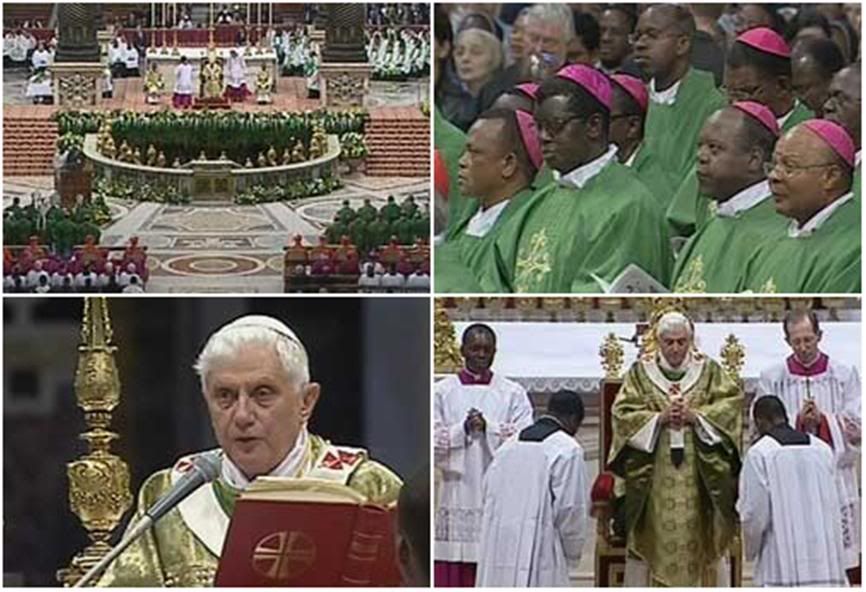
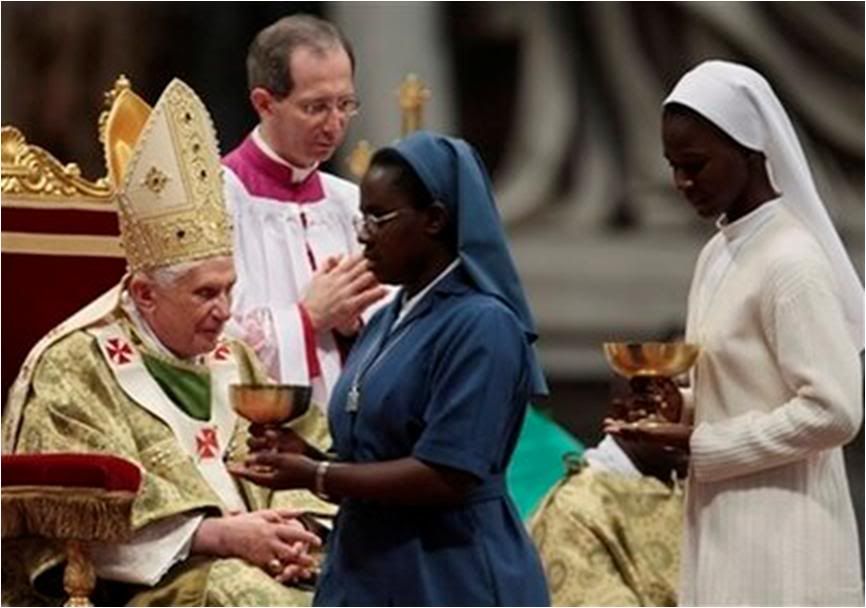 Pope celebrates Mass
Pope celebrates Mass
to cap Africa meeting
By ALESSANDRA RIZZO

VATICAN CITY, Oct. 25 (AP) – Pope Benedict XVI ended a three-week Vatican meeting on Africa Sunday with a call for peace and reconciliation among all people on the continent, regardless of ethnic and religious differences.
The Pope celebrated Mass in St. Peter's basilica to cap the meeting on the role of the Catholic Church in Africa.
"Courage! Get up, African continent!" Benedict said during the Mass, which he co-celebrated with some of the prelates who have attended the synod.
The Pope also said that globalization should be regulated in order to include all nations, not just developed ones.
Globalization, he said, is not governed by forces that are independent of the human will and can be adjusted by men. He added that the Catholic Church is working to promote development for all countries.
Benedict said that reconciliation is necessary to ensure a just peace in Africa, and called on all people to contribute regardless of ethnic, religious, language, cultural or social background. He praised the work of missionaries as one that is both respectful of the local cultures and essential to help Africa out of hunger and disease.
The two-hour ceremony, which featured traditional music, chants and prayers from Africa, formally closed the synod. Among those who co-celebrated the Mass was Cardinal Peter Turkson of Ghana, who was appointed Saturday to head the Vatican's justice and peace office.
The appointment was one of the most significant pieces of news to come out of the meeting, as it cements the cardinal's standing as a possible future papal candidate.
Turkson told reporters three weeks ago there was no reason there couldn't be a black Pope, particularly after Barack Obama was elected U.S. president.
During the meeting, the 300 bishops and cardinals looked at pressing issues such as AIDS and political corruption on the continent.
In their final message, the bishops told corrupt Catholic political leaders in Africa to repent or quit public office and stop wreaking havoc on their countries. In their final recommendations, the synod also called for starting religious dialogue with followers of Islam and African traditional religions.
Speaking to the faithful after the Mass, the Pope praised the "dynamism of the Christian communities, which keep growing in quantity and quality" in Africa.
While the Vatican has been concerned about the flagging faith of some Catholics in the affluent West, Church officials are heartened by the vibrancy of churches in parts of Africa and Asia.
In March, Benedict visited Cameroon and Angola, both of which have large Catholic populations.
[Modificato da TERESA BENEDETTA 25/10/2009 19:39]